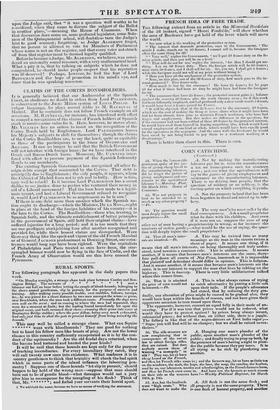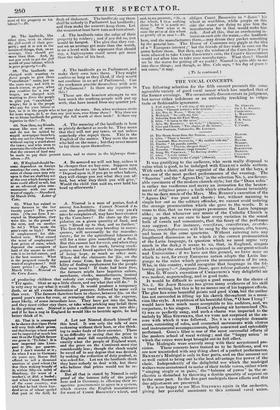51. When the honourable gentleman spoke of the jus• tin
of giving cheap bread to the manufacturing labourer, did he forget the justice of giving employment and sus- tenance to the agricultural labourer ?—Morreing Post, 7th March 1834. House of Commons.
52. Was not property in land to be attended to as much as any other property? —/b.
if it were not so, suppose the ease of any other sct of men having a proprietorship in wrong, as for instance the receivers of stolen goods ;--what would be the use of saying, the ques- tion will deeply injure the small proprietors?
sheet of paper. It means one thing, if it means that all men's interests, on being thoroughly and truly under- stood, tend towards a common rule. 'Ibis is utilitarianism. It means another, if it means that because men's interests are the same, there- fore pull down all courts of Nisi Prius, inasmuch as it is impossible that plaintiff and defendant should differ in opinion. This is ballism. And it means another, if it means that because men's interests are the same, it is our interest to support the man that lives by robbing on the highway. This is knavery. There is very little utilitarianism talked where this comes from.
55. That it is admitted the price of corn would not belowered.—Ib.
The opponents, however, commit an equal folly in their mode of an- swering. For if it was true that prices would not be reduced, what would they have to protest against? by prices being always meant, substantial prices ; for without that, on either side, there is a juggle. The fallacy is like that of the negro-drivers on East India sugar ;— " Sugar you will find will be no cheaper; but we shall be ruined never- theless."
57. Ave, but the landlords want "high rents." Who does not want to make the
53. The question would A. The very men"who most suffer by the most deeply injure the small final consequences. Ask a small proprietor proprietors.—lb. what lie does with his children. And even A. Not by making the manufacturing labourer pay for it. Give the manufacturers a tax on home-grown corn for nineteen years ; and see what the agriculturists will say to the justice of giving employment and sustenance to the manufacturing labourer. There is no driving into people, that the question of robbery or no robbery, is the turning-point on which everything depends.
A. Not the property in land that line been been begotten in fraud and raised up in rob- bery.
54. That all men's inter- A. This may be twisted into as many cats are identical.—/b. meanings as the man in the streets twists a A. Banging one man's plunder of the public, upon another man's plunder of the public ; and finally trying to prop up both, by the pretence of men's having aright to plun- der the public because they pay tuxes. It is all trying to be rich by plundering one another.
A. All flesh is not the same flesh ; and all property is not the same property. There is one flesh of honest property, and another most of his property or his labour ?—lb.
5$. The landlords, like other men, wish to obtain the fen worth of their pro- perty ; and it is not in the nature of things, that, on an average, they should get more than that. And, do not you wish to get the full worth of your labour, which is your property?—lb.
61. If England should be- come dependent on foreign conntrks for corn, the advo- cates of cheap corn may rely upon it that we shall buy not at the cost which foreign na- tions could afford to sell, but at an advanced price com• mensnrate with our own want of supply.—Standard, 3d March 1M34. Letter of Cato.
62. What has ruined so many farmers in the last twenty years ? The poor's rates. (On one farm I oc- cupied in Hampshire, they were 2.5s. in the pound on the rent, and on another is. M.) What made the poor's rate so high ? Want of employment for able- bodied men. What caused the want of employment ? Low prices of corn, which deprived the occupiers of land of the means to culti- vate it to its full extent, and au the beat manner. What is theproposed remedy for want of employment ? Still lower prices !— Age, 9th March 1634. Nimrod on Me Corn Laws.
merchants, clerks, manufacturers, instead of producing children that nobody can employ. But says Nimrod, " Try again. Shut us up a little closer, and see what that will do." It is very easy to say what it would do. It would produce a temporary
flush, or at all events diminution of pressure, followed by more evil than ever. The farmers therefore have to choose, between 25s. on the
pound poor's rates for ever, or retracing their steps, at the expense, most likely, of some immediate loss. They have got into the bush, and they must either stay there, or take what pricking may befall them in the getting out. Nimrod is quite a sufficient man to see into this ; and if he has a nag in England he would like to bestride again, be had better think of it.
63. That it is attempted to be shown that Open Ports will very little affect prices, and that foreign wheat could not he imported at much less cost thaw the English farmer can grow it. 'Tis false ! It is now imported into Liver- pool at 28s. per quarter. And I don't wonder at it ; for when I was in Germany six years ago, Baron Bid offered to sell a thousand quarters of good wheat (he was then making brandy of it, within" fifty-six miles of Hamburg, for want of a market), at :aki. a bushel ; and when Count Bassewitz of the smile country, was told that he bad three hun- dred acres of wheat spoiled that year de the .field, he
dealt of dishonest. The landlords say there shall he nobody in Parliament, but landlords; and then make the weavers keep them. Let the weavers at least have turn mid turn about.
A. The landlords raise the value of their property by robbery ; and if you did so, you would be hanged. The plea that they can. not on an average get more than the worth, is on a level with the argument that should say, a highwayman could never get more than the value of his beat.
A. The landlords go to Parliament, and make their own laws there. They might combine as long as they liked, if they would riot combine in an act of Parliament. Can the workmen provide themselves with acts of Parliament ? Is there any injustice in this?
These are the heaviest attempts to see how much the working-people will put up with, that have issued from any quarter yet.
A. The meaning of the landlords is here as plainly declared as needs be. They mean that they will not pay taxes, or not unless somebody else repays them. This is the English of the matter. They were the men who laid on the taxes ; but they never meant to lay them upon themselves.
A. Nimrod is a man of genius, foal[ d among fox-hunters. Cannot Nimrod di- cern the possibility that the very pot r's rates he complains of, may have been created by the Corn-laws ? He shuts up the po- pulation on a given quantity of food, and says " Breed up to that, and no further." The first that must stop breeding in conse- quence, will necessarily be the manufac- turers; for to the agricultural labourers it will for a time give something of a flush. But this cannot last for ever, and when they have bred up to the mark, farming stock- getters must breed against the impossibility of being kept, as much as other men. Where did the claimants for 25s. on the pound come from, but from the impossi- bility of finding employment for the people that were bred ? If trade had been free, the farmers might have begotten sailors,
A. Be assured we will not buy, unless it be cheaper than we buy now. Suppose men were confined to one baker, and were told, " Depend upon it, if you go to other bakers, they will charge you not what they can af- ford, but what they think you will give." Would the child that said so, ever hold his head up afterwards ?
A. Let not Nimrod disturb himself on this head. It was only the talk of men reckoning without their host, or else think- ing to make fools of their enemies. There is no difficulty in seeing that the price in England must fall considerably, which is exactly what the people of England want, and the price on the Continent must rise considerably less; though the shock might be eased off in any degree that was desired, by making the reduction of duty gradual, as was asked for. Let not the landlords think they have nobody to deal with, but those who believe that prices would not be re- duced.
But all that is stated by Nimrod is only proof of the intense fully of the people here and in Germany, in allowing their re- spective governments to agree in a system, which starves the English manufaeturer for want of Count Bassewitz's wheat, and
said, in my presence, ir the wheat, I care nothing about it, for it is worth no- thing." Now what is to raise the prkle of this wheat E0 greatly all at once ?—lb.
here, and the manufacturers there,—may dream they pocket something by the general loss. The House of Commons may giggle at the idea of a " European interest ;" but the friends of free trade in corn see the game before them. But then, says the wisdom of the Corn-laws, if you were allowed to take Count Bassewitz's corn, the Count's Government would not allow him to take your manufactures. What then Should we be the worse for getting all we could ? Nimrod is quite able to see into these things; and though, as Mrs. Cole says, " his day of grace is not come," it may. (To be continued.) obliges Count Bassewitz to " damn " his wheat as worthless, while people on this side the water are dying to give him the manufactures for it that would make him rich. Arid all this, that an overbearing in- terest on each side the water,—the landlords





















 Previous page
Previous page